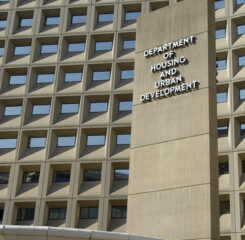HUD Makes Eviction Moratorium Penalties Clear
HUD’s Office of Multifamily Housing has updated its Questions & Answers document for COVID-19 to reflect the CDC’s eviction moratorium for counties with heightened levels of community transmission until October 3.
The updated Q&A points housing providers to the CDC’s August 3 order and adds one new question: What are the penalties for a landlord, owner of a residential property, or other person with a legal right to pursue an eviction or a possessory action violating the CDC Order?
The answer refers providers to the CDC’s Order and the Declaration form itself.
The Order states that persons violating the Order may be subject to a fine of no more than $100,000 or one year in jail, or both, if the violation does not result in a death, or a fine of no more than $250,000 or one year in jail, or both, if the violation results in a death. An organization violating the Order may be subject to a fine of no more than $200,000 per event if the violation does not result in a death or $500,000 per event if the violation results in a death. The Order also states that the U.S. Department of Justice may initiate criminal proceedings as appropriate seeking imposition of these criminal penalties.
And, the Declaration form includes this language: “If your landlord violates the CDC order, they could be subject to criminal penalties, including fines or a term of imprisonment.”
Older adults with low incomes who do not live in HUD or USDA affordable housing are particularly at risk for eviction and its long tail of damage to tenants and landlords. While HUD and USDA program will adjust tenant rents when incomes decrease, private market landlords do not. We also assume that older adult workers with low incomes were among first to leave the workforce (for health reasons or just regular job loss) and they are typically among the last to rebound after any kind of economic downturn.
Recent survey data from the U.S. Census Bureau show the extent of older adult households at risk of losing their homes.
In a “household pulse survey” completed during June 23 to July 5, 32% of 65+ renters say they are very likely (16%) or somewhat likely (16%) to have to leave their home in next 2 months because of eviction.
The U.S. Census Bureau launched the Household Pulse Survey in April 2020 to quickly and efficiently gauge the impact of the coronavirus pandemic on households. The HPS is sent to about a million households.
Over the course of 33 collection cycles, Household Pulse Survey data have been disseminated quickly to inform federal and state response and recovery planning. The June 23 – July 5 Household Pulse Survey results are from the most recent of the cycles.
According to latest Household Pulse Survey:
- 12% 65+ owners say they are very likely (5%) or somewhat likely (7%) to leave their home in next 2 months because of foreclosure.
- 32% of 65+ renters say they are very likely (16%) or somewhat likely (16%) to leave their home in next 2 months because of eviction.
- 7% of 65+ owners say they have no (2%) to slight (5%) confidence they can pay their next mortgage payment.
- 12% of 65+ renters say they have no (5%) to slight (7%) confidence they can pay their next rent payment.
- 4% of 65+ owners say they are not caught up on their mortgage payments.
- 11% of rents say they are not caught up on their rent payments.
It should also be noted that the racial disproportionality of housing tenure in the U.S. is extreme. There is very large Black / white homeownership gap for 65+ households (about 85% of white 65+ households are owners, only 65% of Black 65+ households are owners). Compared to white households, Black and Latinx 65+ households carry more mortgage debt into retirement. And, household wealth (even excluding home equity) for 65+ renters pales in comparison to wealth (excluding home equity) for 65+ owners.
Read HUD’s updated Office of Multifamiliy Q&As here.
Read the October 3 CDC Order here.
Read more about the Census’ survey here.

Most Recommended
October 15, 2025
 Shutdown Week Three: Impact of Ongoing Closure on Affordable Housing
Shutdown Week Three: Impact of Ongoing Closure on Affordable Housing
December 10, 2025
Fiscal Year (FY) Funding 2026
October 07, 2025
Immigrant Workforce Matching Program Brings Workforce Relief
Recently Added
December 19, 2025
House Moves Forward on Affordable Housing Reforms
December 19, 2025
White House Cannabis EO Paves Way for Research, Access
December 19, 2025
LeadingAge Urges DHS to Maintain "Public Charge" Guardrails
December 18, 2025



